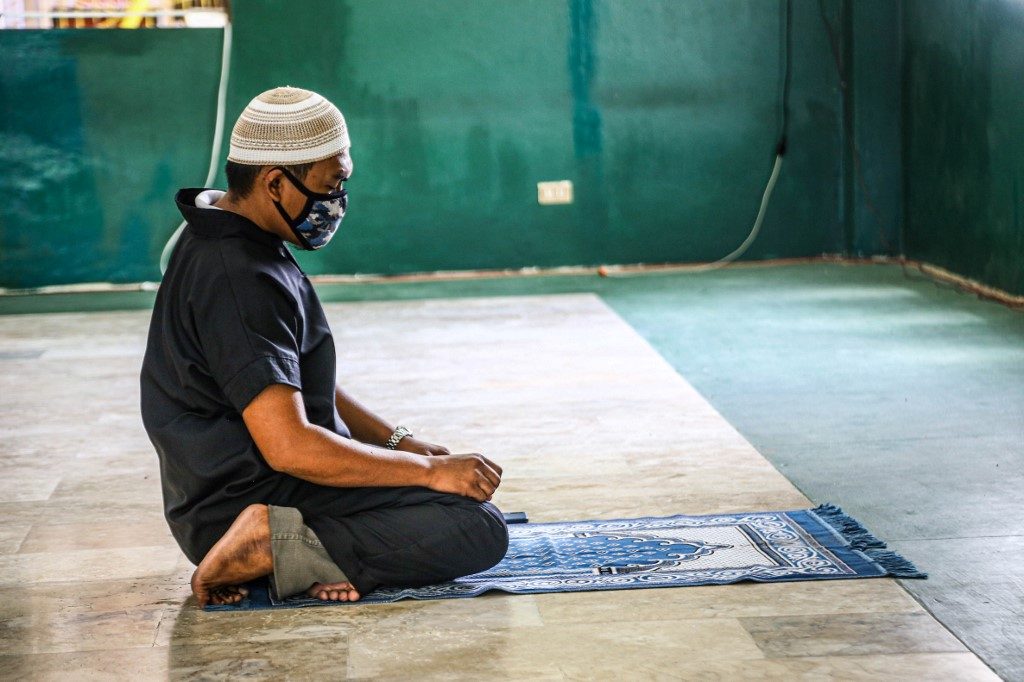SUMMARY
This is AI generated summarization, which may have errors. For context, always refer to the full article.

MANILA, Philippines – Jun Datu-Ramos, 46, remembers the Eid’l Fitr feasts of his childhood: there was good food; his whole family was present; and everyone was full of joy because they knew their sins were forgiven and they did what was pleasing to God.
Eid’l Fitr celebrates the end of the fasting month of Ramadan, when Muslims are prohibited from eating or even drinking water as they exercise patience and self-control while helping the poor. (READ: Why Muslims celebrate Eid’l Fitr, the end of monthlong fasting)
Eid’l Fitr this year, however, is different from the feasts of Datu-Ramos’ youth: mosques are closed; public gatherings are prohibited; and many countries remain on lockdown due to the COVID-19 pandemic that has affected millions around the globe.
Datu-Ramos, spokesperson of the National Commission on Muslim Filipinos (NCMF), said they have been advised to stay home, and to just invite an imam to conduct Eid’l Fitr prayers in private gatherings of no more than 5 to 10 people.
Saidamen Pangarungan, secretary of the NCMF, said Muslims indeed observed Ramadan in unprecedented ways this year.
“Undoubtedly, these are faith-testing times. But the bigger the test, the greater our faith in Allah. Ramadan comes to an end and our sacrifices and reflections still deserve a solemn and profound celebration. We should view these tests as an opportunity through unshaking faith to honor Allah,” Pangarungan wrote in his message for Eid’l Fitr this year.
While mosques remain closed, Pangarungan noted too how COVID-19 gave Muslims the opportunity to pray more to Allah, to read the Quran, and to develop patience – “a perfect way of internalizing the beauty of Islam.” (READ: [REFLECTIONS] Ramadan and isolation in the time of COVID-19)
Pangarungan also said he is proud of how Muslims have acted during the coronavirus lockdown. He said the NCMF, through the volunteerism of their personnel, was able to help 100,000 beneficiaries around the country, including orphans, indigents, and people who lost their jobs due to the pandemic. (READ: [REFLECTIONS] How Ramadan can prepare us for a post-pandemic life)
“The good hearts of Muslims shone brightly in easing the pain and suffering of those who were helpless and hungry. The pandemic exposed the weakness of most, but was also able to highlight one of the most important teachings in Islam, which is charity,” Pangarungan said.
Marawi Siege anniversary, too
Zia Alonto Adiong, parliament member of the Bangsamoro Autonomous Region in Muslim Mindanao, noted that Eid’l Fitr this year comes not only as the country faces COVID-19.
The feast also coincides with the 3rd anniversary of the 2017 Marawi Siege, when terrorists linked to the Islamic State (ISIS) seized the Islamic city of Marawi in the southern Philippines. The battle between the local terrorists and the Philippine government lasted 5 months, killing 168 soldiers and leaving tens of thousands homeless.
Civil society leaders said on Saturday, May 23, that up to 126,775 individuals still live as evacuees on the outskirts of Marawi and in other areas, leaving them more vulnerable to COVID-19.
“For the Bangsamoro people, most especially the Meranaos, the threat of COVID-19 makes the rebuilding and rehabilitation of Marawi City all the more urgent and necessary,” Adiong said.
At the same time, he encouraged his fellow Muslims in the face of their trials, saying that “our faith also reminds us that we are not given burdens that we cannot bear.”
“Our burdens are only as heavy as our belief in the mercy and compassion of Allah, and the trials we confront are sent to us with the intention of strengthening our faith in Allah and affirming our commitment to each other as brothers and sisters,” Adiong said.
Muslims interviewed by Rappler said they celebrate Eid’l Fitr to thank Allah for the fruitful fasting month of Ramadan, and to remind themselves of the lessons of fasting: obedience to God and compassion for the poor and hungry.
Datu-Ramos said Eid’l Fitr emphasizes the value of compassion, “since our fasting makes us experience how the poorest of the poor live on a daily basis, without having access to clean water and food.”
It also stresses generosity to the poor, “which is our acceptance that worldly wealth is from God, and that we have no right to deprive our brothers and sisters in faith of what God meant to be shared by all.”
“When it comes to human suffering, such as hunger and extreme poverty, compassion for your fellow men is the greatest sacrifice you can give and offer to our God,” Datu-Ramos said. – Rappler.com
Add a comment
How does this make you feel?
There are no comments yet. Add your comment to start the conversation.